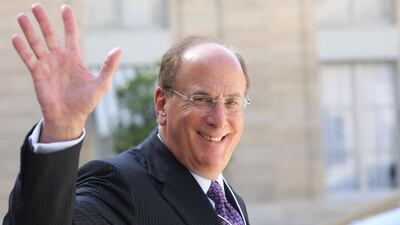BlackRock’s chief executive Larry Fink is exiting some of the investments carrying sustainability risks and said the environment will be at the core of all new investments by the world’s biggest asset manager.
Mr Fink indicated the fundamental shift in his firm's investment policy in his 2020 letter to chief executives of some of the largest global corporations. The annual communication from the founder of the New York-based asset management firm will put pressure on other global money managers to adopt ethical investment policies.
Climate change has become a defining factor in companies’ long-term prospects and “climate risk is investment risk”, he said.
“I believe we are on the edge of a fundamental reshaping of finance,” he said. “In the near future – and sooner than most anticipate – there will be a significant reallocation of capital.”
Mr Fink said BlackRock, which manages about $7 trillion (Dh25.7tn) in assets, is taking a number of initiatives including making sustainability a part of portfolio construction and risk management. Exiting investments that present a “high sustainability-related risk”, such as thermal coal producers and launching new investment products that screen fossil fuels are among the other measures, he added.
Mr Fink is addressing climate change as money managers come under increased scrutiny for their investment practices. After facing criticism for not doing enough in its own portfolio, BlackRock earlier this month joined Climate Action 100+, the world’s largest investor group by assets, pressing companies to changing policies on climate.
The Climate Action 100+ represents around $41tn in assets and includes more than 370 institutional investors, such as the asset management units of HSBC and UBS.
“We don’t yet know which predictions about the climate will be most accurate, nor what effects we have failed to consider. But there is no denying the direction we are heading,” Mr Fink said. “Every government, company, and shareholder must confront climate change."
All investors, along with regulators, insurers, and the public, need a clearer picture of how companies are managing sustainability-related questions, Mr Fink said. Each company’s prospects for growth are inextricable from its ability to operate sustainably and serve its full set of stakeholders.
“We believe that when a company is not effectively addressing a material issue, its directors should be held accountable,” Mr Fink said.
Given the groundwork BlackRock has already laid on disclosure, and the growing investment risks surrounding sustainability, “we will be increasingly disposed to vote against management and board directors when companies are not making sufficient progress on sustainability-related disclosures and the business practices and plans underlying them”, he added.
Last year, the European Parliament and EU member states agreed new rules placing obligations on capital market participants to "inform investors about their compliance with the integration of ESG (environmental, social and governance) risks and opportunities".


